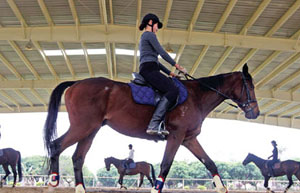Living books share stories in Beijing's first human library
Updated: 2011-12-26 09:55
By Du Jie and Zhou Xiaoxiong (China Daily/Xinhua)
|
|||||||||
BEIJING - Li Xingning has nurtured the dream of being a librarian ever since she was a child. This Christmas, her dream came true, only that her books were real people.
Beijing's first human library opened on Saturday night, with dozens of readers and six "living books" exchanging their life stories and ideas.
Books in a human library are real people who engage readers in a direct dialogue. Readers can't take a living book out of the library.
"Here we get to know people who have interesting life stories to share, and also understand who they are and why they live in a particular way," said Li Xingning, who ran the human library.
The 28-year-old architect hoped her library would serve as an interactive platform to promote mutual understanding among people who otherwise had no opportunity to meet and talk in real life.
"Think about a street singer you always wonder about or an animal protection advocate that you have never met. Here you can borrow such living books and talk with them," she said.
The human library concept originated in Denmark in 2000, and the idea has since spread around the world to more than 45 countries. In China, such libraries have sprouted in Shanghai and Guangzhou. It aims to reduce prejudices and promote tolerance and understanding via dialogue.
A living book is a person that has chosen to be a representative of a certain group.
Inside the 120-square-meter library, Li and her colleagues painted one side of the wall to resemble exquisite bookshelves filled with books. Yu Shi, one of the six volunteer "living books", was playing a guitar, singing John Lennon's Imagine.
"If there were more people willing to share their stories, there might be fewer misunderstandings," Yu, 24, said.
Yu has been living a vagabond's life for nine months, traveling from Southwest China's Yunnan province all the way to Beijing, with little money and a guitar.
He earned a living by singing on the street, and sold postcards printed from the photos he took during his journey. Some of these postcards were hung on a wall of the library, on each of which he had written a few lines of prose.
He was on a tight budget, but still volunteered to teach music in a village school in Yunnan for a month.
Before setting off on this trip, he had worked as a technician in an IT company, living a life "that was too stable and changeless for me to want to go on".
"I shared my stories not to encourage others to quit their jobs like I did," Yu said. "I just want to tell them that once outside our comfort zone, we may find the beauty of life that we've never imagined before."
During his trip, he made a friend who later turned out to be the owner of a large company and a millionaire.
"She told me she envied my freedom," Yu said. "It feels exceptional to be envied by a millionaire."
Besides Yu, there were a housewife doing charity work, a campus folk singer, an architect studying Tibetan architecture and a bisexual who shared their stories.
Li Xingning said the "living books" were chosen as they had followed their dreams. Every day at least one human book will be available in the library, she said.
The library also has an online version, where people outside Beijing can share their stories.











